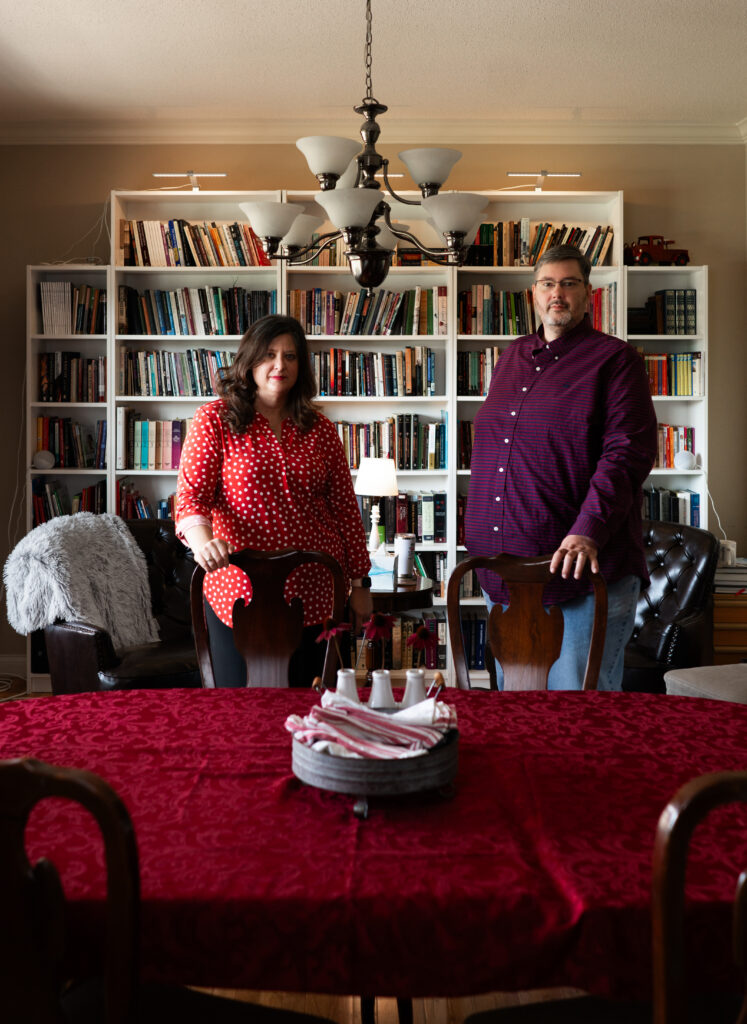Babies start out blank, clean, new, and parents get to be the ones who expose them to whatever they will know and how they will know it. Like teachers teach who they are, parents parent who they are as their children’s first teachers, passing along bits of themselves and the lessons they’ve learned throughout this journey we call life.
Here, meet three families doing this: the Schaitels, who have three children they adopted after being foster parents for six years; the Youngs, who have six biological children; and the Mayhews, who have four children, their youngest adopted from China. As they tell their stories, the parents share their parenting philosophies, and the family members share the things they learn from each other.
We hope their experiences, perspectives and wisdom they’ve learned along the way encourage you in your own being with your family, whomever that includes and whatever that looks like for you.
When Karey and Jason Schaitel got married in 2000, Jason’s teenage daughter lived with them part-time and was getting ready to start her adult life. Both in their mid- to late-thirties, Karey and Jason found out having biological children wasn’t a possibility for them, and they started wondering what to do with the rest of their lives.
“What do you do when you’re an empty nester in your 30s? We thought it was too early to buy the Winnebago,” Jason says.
They began what Karey describes as a “deep spiritual journey,” during which they discovered L’Abri Fellowship International. According to their website, the organization is comprised of study centers around the world founded by theologian Francis Schaeffer and writer Edith Schaeffer, shelters where people can “ask honest questions about God and the significance of human life.”
Karey and Jason traveled to the L’Abri home in Rochester, Minn., several times. Jason had enrolled in theology classes, so on their drives there and back, they listened to podcasts and read books that helped them discern their own desires and how those might align with God’s. Although they considered working as hosts at a L’Abri location, they realized they wanted, instead, to make “a little L’Abri in [their own] home.” In November 2009, Karey woke up to the news talking about adoption; she thought about foster care and knew it was right. They decided to pursue it.
In January 2010, the Schaitels began the 13-week foster parent certification course, where Jason says they found out there are more than 100,000 children in the U.S. waiting to be adopted at any given time, and most of them are teenagers and children over the age of 9; many of these children age out of the foster care system without being adopted and are then without a family support system.
Jason and Karey decided to host children from difficult cases many foster families didn’t say yes to, cases often involving older children. Their first foster children were placed with them for a weekend in September 2010, and throughout the next six years, they fostered children from 20 cases, including six short-term placements and 14 long-term placements.
Although foster parents can initially be excited because they see themselves as helping children, the children don’t always see it that way, Karey says: The kids are grieving, because they have lost everything, including their home, neighborhood, school, parents, friends and pets. And even though their biological parents have made choices that have gotten the children taken away, the children still love their parents. Karey says foster parenting is helping the children “live life through grief and not being surprised at the grief, but not dwelling on it.”
Karey’s background in social work helped her intellectually understand trauma and de-escalation techniques; she says the confidentiality required in order to keep the children safe was one of the most difficult parts of being a foster parent.
“It was the hardest thing and one of the most humbling things: You have a child who doesn’t know you, you don’t know them, they’re having a hard time, and when kids are having a hard time, they don’t communicate that — they communicate through behavior — and so, you’re taking them to the grocery store, and they’re melting down, and the people are looking at you like, ‘Well, you’re the parent, so fix this,’ and you can’t just put a sign on that says, ‘I’m just the foster parent. We just met. There’s not a bond here.’ That’s not appropriate,” Karey says. “So then, you’re humbled, because you realize you have to carry that burden [for the child], you have to carry the burden of the stares and the people’s judgment.”
The foster care system is a broken system, Jason says, and it’s important for people becoming foster parents to realize that.
“You’re not going to fix it; you’re going to have to learn to operate within a broken system,” Jason says. “Because these kids need it. Parents need it.”
Karey says while she was fostering, people told her not to get attached to the children in order to protect her own emotions, since the kids could be transferred to another home or reunited with their biological family at any time. Since she had studied attachment and child development, she knew that was the opposite of what babies and children needed: They needed her to attach to them in order to solidify their brain development. She says she had a conversation with God about it and received peace, knowing she needed to attach to the children no matter the cost to herself.
Approximately a year after fostering their first children, the system placed a 2-year-old boy and his half-sister with them. The sister was reunited with her biological father; the boy could not be reunited with their mother or his own biological father. After watching how he bonded with other children who came into their home and then struggled when they left, Karey and Jason decided it was time to become adoptive parents. Throughout a two-year process, they adopted him, so he could experience permanency.
Wanting him to have a sibling, they searched for another child who was eligible for adoption. They fostered a girl who was 4 years old for a weekend, “fell in love with her” and decided to adopt her. More than a year later, they learned their daughter’s biological mother had a baby who would go directly into the foster care system. When the baby was five days old, they brought her into their home, and two years later, finalized her adoption. With an impending move to another state, they made the decision that their time as foster parents was finished.
Karey says it’s important to realize the goal of the foster care system is the reunification of families; sometimes, families need space to heal away from each other, and that’s what foster care provides. Jason says he sees foster care as stewardship, caring for the children until they can be reunited with their families, whether that happens before or after adoption.
“It’s a very hard ministry, but it’s also very good, because good families help generations,” Karey says. “So, you’re not doing easy things, but you’re impacting generations.”
Ministering to the children’s biological families is another important piece of the Schaitels’ mission: Jason says many of the children’s parents are young enough to be his own children. As a teenager, he experienced living in foster care, and because going to rehab for drug use when he was a teenager transformed his own life after he experienced having reduced rights to see his daughter, he sees the biological parents as people first — not as parents or as drug addicts — and wants to support them in making decisions that change the trajectory of their stories, as well as help them reunite with their child. Often, he states in an email, “They relinquished parental rights out of love for the child and not to be free of the responsibility of the child.”
Jason does this through sharing updates of their children and having phone conversations with them to discern if it is safe for their biological children to be a part of their lives or not. He also passes along parenting skills, because many of the biological parents were raised in situations where they didn’t learn how to parent in a healthy way. Over a process of years, he says it has been a great joy to see some of the parents turn their lives around; in some cases, their children getting taken away from them is their rock bottom and catalyst for recovery, he says.
When a child is adopted in the state of Missouri, they receive a new birth certificate with the date of birth, date filed, county and sex of the child that was listed on their old birth certificate, along with child’s new adoptive name and adoptive mother and father’s maiden and last names, ages and states of birth; Karey says adoption literally changes the child’s family tree. Through this, Karey says she’s learned “love is never really wasted,” and the more people a child has to love them, both biologically and through adoption, the better.
Karey says being a foster parent is a blessing that is not a “super-happy-all-the-time blessing,” but “a deeply-rooted blessing that eventually will bloom.”
“For me, it’s my faith that’s really helped me the most,” Karey says. “People are made in the image of God, and even if they’re broken images, they’re still images. And God loves redeeming broken things.”


